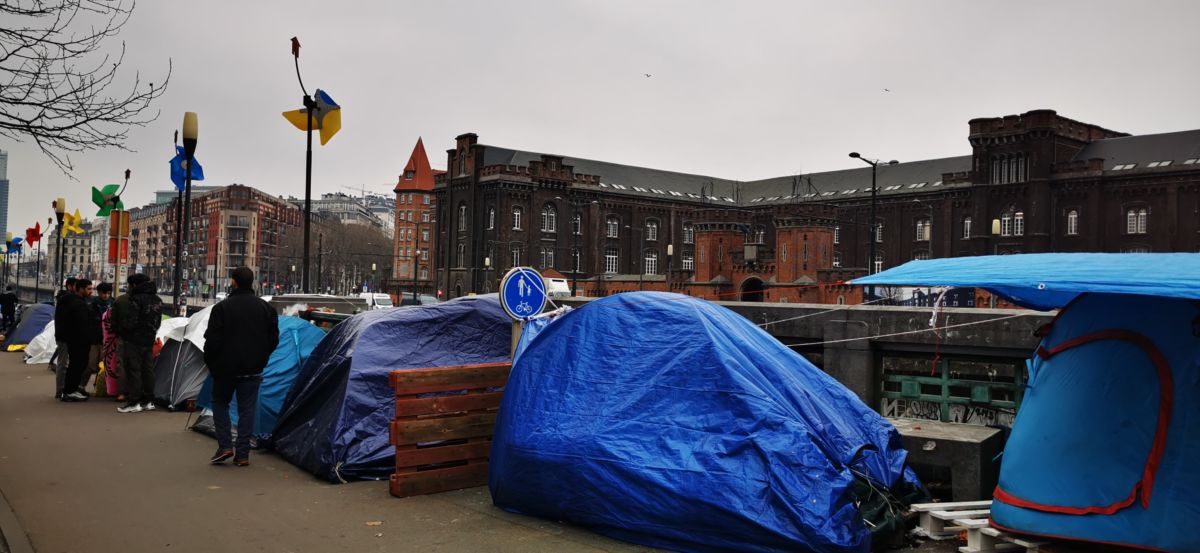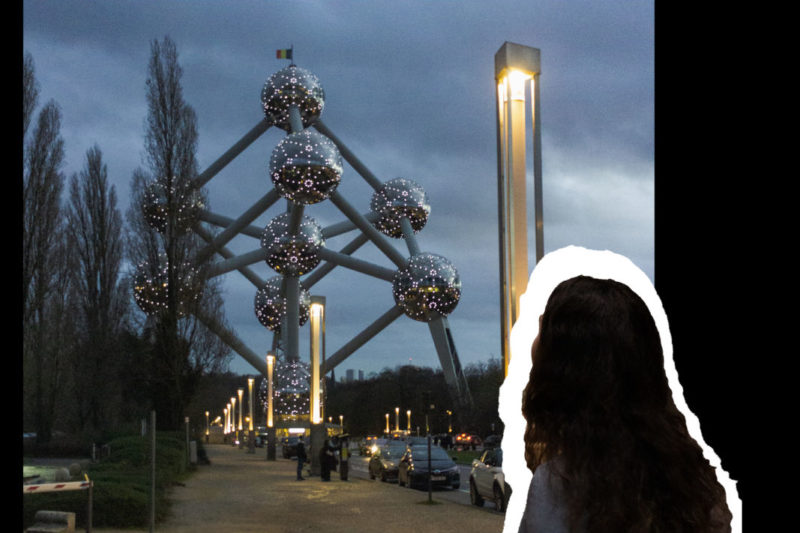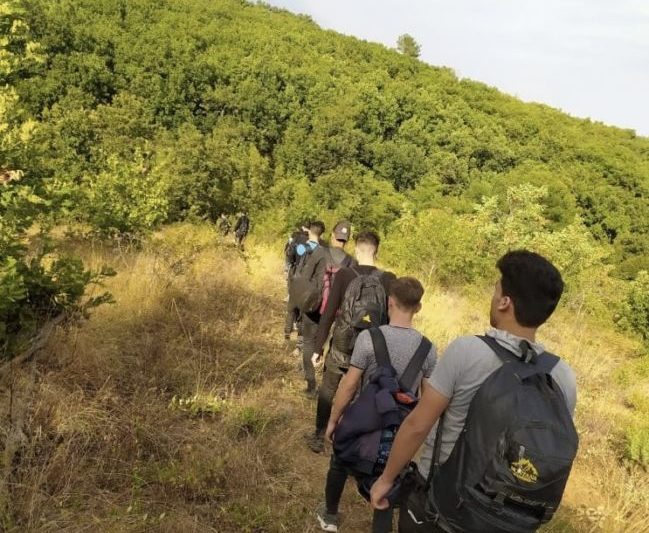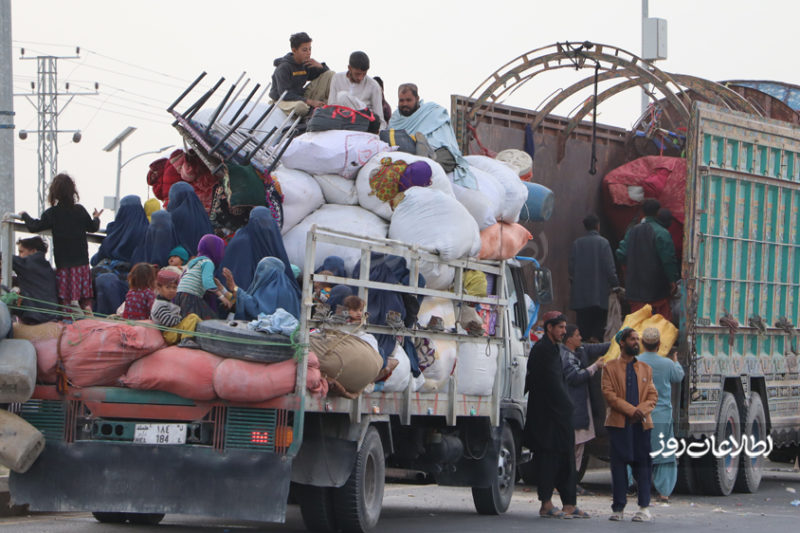Refugees on the streets in the “capital of Europe”

Having escaped war or unrest in their home countries, refugees are now encountering difficulties in the European Union.
In Brussels, in mid-February, a mass evacuation from a squat in Rue des Palais, in the city’s Schaerbeek neighbourhood, was carried out in chaotic scenes that left hundreds of asylum seekers on the streets with no alternative accommodation.
Earlier surveys had shown that of the 784 people living on the premises, 735 were refugees seeking asylum. While the evacuation plan was being prepared, several rooms in the building were set on fire and it was reported that a body was found by the emergency services. According to eyewitnesses, the victim was an African immigrant but this has yet to be confirmed by the Belgian authorities.
“Capital of Europe”
An increasing number of immigrants who have reached Belgium by various means are not taken care of upon arrival, and hundreds of refugees spend their days and nights in tents or on the streets of what is dubbed the “capital of Europe”.
On the cold and wet winter morning of the evacuation, while many of the police and firefighters of Brussels were still present, hundreds of angry migrants were waiting impatiently for any information.
The vast majority of them were hoping to be taken care of and transferred quickly to a shelter.
The government had decided that the squat, which had been housing hundreds of refugees from different countries for the past few months, should be evacuated and its occupants re-located.
“Now we don’t know what our fate is.”
A Burundian immigrant who had been living in the ‘Palais 48’ building for several weeks said, “despite many problems, this place was at least a shelter for us, and now we don’t know what our fate is.” He said that sometimes there were fights and added that occupants reported that two people died on the premises, but was not able to provide further details.
An Afghan refugee, who had been living in tents for a long time and was using “Le Palais”, was happy about the action of the Belgian government in closing the squat and re-locating people, but he wanted to be given a place in permanent accommodation to further his work.
The situation was tense
He also claimed that two people had died in the building. The situation was tense, with many sufferings from mental and physical health problems, and sometimes there were conflicts between immigrants. Several others also backed up this testimony but could not confirm the identities of the deceased. This has not been confirmed or denied by the Belgian authorities.
To carry out the evacuation, the federal government collaborated with the Joint common Community Commission, safe.brussels, local police, and health and social service providers.
On Tuesday 14 February, 250 occupants of the building were temporarily housed at Crossing Schaerbeek, where they also underwent examinations and received medical care.
The 163 asylum seekers were finally accommodated in 60 rooms at an Ibis hotel in the Flemish municipality of Sint-Pieters-Leeuw, due to a lack of space in the emergency accommodation centre. The accommodation site was reserved until 28 February.
Not informed beforehand
The local authorities in Sint Pieters-Leeuw strongly objected to the fact that they were not informed beforehand.
The asylum seekers present in the abandoned building have recently been registered by a mobile team of Fedasil which will then transfer them to specific reception centres. It is worth noting that Fedasil has yet to offer this opportunity to thousands of other asylum seekers.
After regional officials announced that the evacuation was “complete” and that only a few people still needed help, the truth was that by the end of the eviction between 250 and 300 people were still waiting for assistance.
One of the reasons given by the government to justify the urgent evacuation of the building was the presence of many cases of health infection, especially scabies.
Afghanistan, Burundi, Morocco and Eritrea
The total number of immigrants – citizens of countries such as Afghanistan, Burundi, Morocco and Eritrea – was estimated to be around 1.000 people, for which reason the authorities decided to distribute them to other centres.
The first day of the two-day evacuation went well, thanks to the cooperation of the social workers and volunteers present, as well as the UNHCR and other organisations that defend the rights of immigrants, with the Brussels government.
More than 200 refugees were welcomed in the sports centre of Schaerbeek, all of whom wore a blue bracelet to prove that they had identity papers. After a first registration step, all their clothes and equipment were disinfected. They were then given access to showers and provided with new clothes.
Finally, everyone had to go for a medical examination, scabies medicine was distributed and those who had serious health issues were taken to hospital by ambulance.
120 people slept in the centre
Of the 200 people who went through the process, around 120 people slept in the centre. The issues escalated on day two, which ended with the discovery of a dead body in the squat.
The following day, more than 90 migrants were transported by two buses to the Ibis hotel in Sint Pieters-Leeuw, in the district of Ruisbroek, by prior arrangement with the hotel.
More than 80 other immigrants were subsequently also sent to the Ibis, bringing the total number to 170 people, which exceeded the hotel’s capacity.
An emergency meeting was held at the hotel, between Tina Martens, chief of staff of the federal government, the mayor of Sint Pieters-Leeuw, the federal police, the health team, the security officials and the hotel manager. They concluded that the rest of the people could stay in the hotel, but with screening by the medical teams.
The chief of staff stated that all migrants would remain at the location for a short period of time before being transferred to a safe location.
The mayor, Jan Desmeth, agreed that the immigrants should be housed temporarily and advocated for the interests of those who have difficulties. He also called for cooperation between municipalities and various organisations.
“This teamwork has produced very good results.”
Mr Desmeth appreciated the support and tireless work of those representing the refugees, and said: “It is very interesting for me to see that everyone here is interested in working with each other without a pre-determined plan and that this teamwork has produced very good results.”
After the announcement of the Red Cross Committee’s cooperation for evening bread, the Belgian government quickly provided lunch and two meals of bread for breakfast and dinner.
It was a long night, and the police had a strong presence inside the hotel, patrolling in shifts until the morning.
Under the coordination of UNHCR, a number of organisations and citizens from different countries such as Afghanistan, Burundi and a range of Arab countries, have expressed their concerns and have also helped the immigrants in the areas of translation, registration and distribution of food.
Note : on March 7th, a few weeks later, the tent camp on the canal in front of the Petit-Château was dismantled by Belgian officials, and roughly 150 refugees were moved among various refugee centres.




